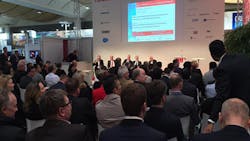BAM! POW! Industrie 4.0 Meets the Industrial Internet!
HANNOVER, Germany — Government and industry professionals from the U.S. and Germany took on the topic of Industrie 4.0 and the Industrial Internet in a panel discussion today hosted by the Industrial Internet Consortium (IIC) and Hannover Messe.
Industrie 4.0 or the Industrial Internet — whatever you prefer to call it — has profound implications: It is changing business models and leading to more efficiencies in production processes, but it will also lead to new challenges such as security, labor qualifications, and new regulatory frameworks for business.
Approaches by the two movements are markedly different: On the one hand, Industrie 4.0 was born out of and is being driven by the German government’s high-tech strategy. On the other, the Industrial Internet is a bottoms-up approach driven by U.S. industry.
While this dissimilarity might well have put the pair on a collision course, people on both sides are sensing ways collaboration may help to achieve common goals.
But first, the differences.
“The Internet of Things is going to fundamentally change the way we work and live, and the opportunities that come out of it to increase productivity are striking,” said Bruce Andrews, Deputy State Secretary, U.S. Department of Congress. “Our view is that government gets in the way. It should step back and unleash the innovation that makes our lives better.”
He added that government’s role is not to regulate but essentially to look at market failures, stressing that keeping government out is the secret sauce of innovation. “You let a bunch of different companies take different approaches and platforms and see which ones hold and grow, and let the market decide who wins.”
Matthias Machnig, Undersecretary of the Federal Ministry for Economic Affairs and Energy, took umbrage at that view. “The Americans’ point of view is that this is done on the platform side, but we know that without a single European digital market we will not succeed. That’s where government can play a role.”
Between those two opposing views, Prof Siegfried Russwurm, Member of the Managing Board of Siemens AG, found some middle ground. “It’s true that the consumer internet was the thing of the U.S. with this huge American market, while Europe was stuck with 28 different regulations. But while that may be stifling, on the other hand it is good because we also think about the consequences and we are trying to build up a framework to make this transformation.
He noted the rich tradition in European history of understanding the true matters of the industrial process and the process parameters. “If we can bring together the Europeans’ understanding of the process with the huge experience of the American economy, it sets a path for the Industrial Internet and Industrie 4.0 to succeed on an even bigger scale,” he noted.
Both sides agreed that the IoT is a global phenomenon, not local. “This really comes down to the fact is that we live a global world — it’s not down to the U.S. and Germany. Every one of the big players are international companies operating in multiple countries with employees all over the world,” said Andrews. “What we really need is an international, global solution with global standards.”
Harel Kodesh, VP and Chief Technology Officer, GE Digital, advocated that both government and industry have roles to play. “We have to rethink the entire framework. We are talking about Industrie 4.0 but we have labor regulation 2.0 and if the framework of our economy is coming out of the 1980s and 1990s we are talking about all of this disruption in regulations, and data security and the labor force. We have to re-evaluate the process of our legal, education and labor framework, and that’s quite a job because it also means a change in the culture.”
All four panelists agreed on the necessity of experimental test beds. “The important thing is for us to experiment, that’s why we like the Industrial Internet Consortium (IIC),” said Kodesh. “Ideally then the government will define the boundaries on what they are willing to tolerate in terms of security and who gets access to what.”
Machnig pointed out that even a company like GE or Siemens doesn’t know everything about the future and how technology will evolve. “In my mind the most important thing is that we have to raise the the competence level and bring together companies of different sizes, the building up of this kind platform is going to take the collaboration of many smart people all over the world,” he stressed.
In the end, the panel did not agree on whether there would be ultimately one platform or many. But they did agree that they share a common view on the need to gain an understanding of how things should function and making sure that they interact.
IoTI is, like IndustryWeek, powered by Penton, an information services company.
About the Author
Karen Field
Group Content Director
Karen Field is Executive Director, Content for Penton’s new Internet of Things Initiative. She has 25+ years experience developing content for an audience of technical and business professionals and a reputation for challenging conventional thinking and taking a novel approach in the creation of world class editorial and conference programming.
Most recently she launched the Internet of Things Summit at the Embedded Systems Conference and has covered the emerging issues associated with the Internet of Things extensively for EE Times, EDN, and Embedded.com.
Karen has a mechanical engineering degree and a master’s of business degree from the University of Minnesota and Boston University.
